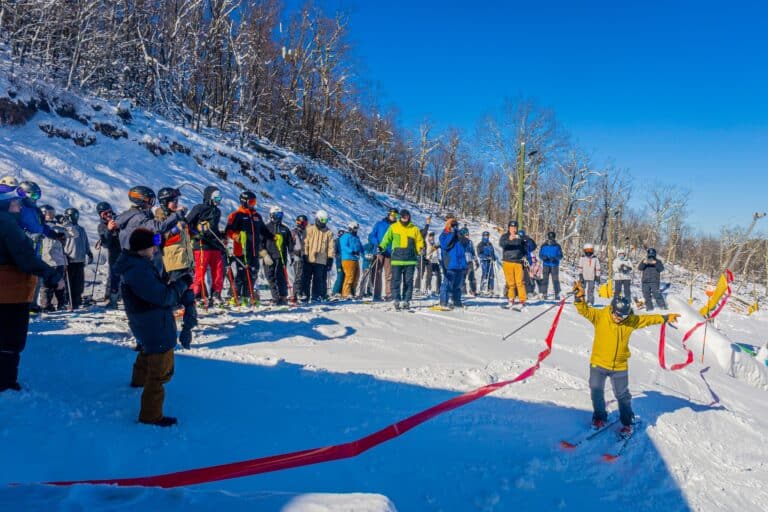After Hurricane Helene, Adventure Guides in Western North Carolina Need Your Support
As rock climbing guides in western North Carolina, we’re situated centrally in our community’s economic ecosystems, driving traffic to other small businesses while sustaining our own. Here’s an example. A family of five from Florida traveling into the mountains may spend $80 for dinner at the Pisgah Bakehouse when they arrive in Brevard, $200 for a night’s lodging at Foggy Bottom Cabins, and $30 for coffee and pastries at Cup and Saucer, before they visit us for instruction and a guided trip at Pisgah Climbing School. Later, they may buy $200 of new outdoor apparel at The Hub for their stoked children, spend $150 on a celebratory dinner at The Square Root, followed by $40 for drinks at Ecusta Brewing.
This is but one family’s experience in a mountain region renowned internationally for recreation. Multiply this by thousands, and this revenue is the lifeblood that many families depend on. Unfortunately, this economic influx was severely impacted by Hurricane Helene, which hit the region during prime tourism season. October, typically an all-hands-on-deck season for small businesses like Pisgah Climbing School, was instead spent volunteering, using our expertise for search and rescue teams while would-be tourists were kept away—both by needed messages encouraging sensitivity, and a general perception that the area was closed to tourism.
To understand the scale of the impact, it is important to consider the role the tourism economy plays in the region. Data from the Asheville Convention and Visitors Bureau estimates the impact of the tourism economy at $3 billion, or 20% of the GDP of Buncombe County. In 2023, over 3,000 businesses in direct tourism-related industries (recreation, hotels, and restaurants) employed nearly 46,000 people across 18 counties in western North Carolina, representing 20% of regional private sector employment. Small and medium-sized businesses in the region had already gone through a tumultuous past few years. After a job loss of over 19% from 2019 to 2020, 2023 was the first year that tourism employment had returned to annual pre-pandemic levels.
The employment impact from the loss of visitor traffic and tourism revenue due to Helene is becoming more evident. October is traditionally the peak month for hotel and rental demand in the region, and airport traffic at the Asheville Regional Airport, which served 240,000 passengers in October 2023. In 2024, figures on hotel stays and visitor traffic indicate a significant decline in tourist spending in the region, impacting guide services, local businesses, restaurants, breweries, and other small businesses that rely on tourism dollars. Unemployment in Buncombe County rose from 2.9% to 8.8% in October 2024, the highest in the state.
This has a ripple effect on local entrepreneurs and employees who will struggle with the lack of income during critical months. For tourists, small businesses provide unique experiences, a memorable dinner with family and friends, or a unique souvenir from a vacation. However, from the business perspective, this represents a source of livelihood, as local owners and employees are supporting their families and contributing to the well-being of the community. Which is why we need a tourism boost, while being extremely sensitive that some towns in our area are still struggling and have a long way to go with rebuilding.
So please come back to western North Carolina. Book a night’s stay at Sweet Peas Hostel in the heart of Asheville and spend a day exploring the Biltmore and the many wonderful shops. Enjoy views that swallow you whole in Linville Gorge and drop by downtown Morganton. Go skiing at Appalachian, Beech, or Sugar Mountain, then explore Boone, Blowing Rock, and Banner Elk. Spend a magical day searching for golden trout in our mountain waters with Davidson River Outfitters. Experience the peace and solitude of the mountains at Pilot Cove before you ride some world-class singletrack in Pisgah Forest. Or join us at Pisgah Climbing School for a guided rock or ice climbing trip. Right now, your day of fun will significantly aid the regrowth of our communities.
Peter K. Yang is a single pitch instructor and guide with Pisgah Climbing School and an epidemiologist with a background in socioeconomic determinants of health. Michael Hogan is a climber and an economist with expertise in Appalachian economic development. Karsten Delap is an IFMGA/AMGA mountain guide with Pisgah Climbing School and a nationally renowned expert in mountain search and rescue.
Cover Photo: Photo courtesy of Pisgah Climbing School








